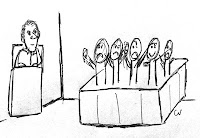Two lesser known disadvantages of fixed mindsets
Thinking about others' qualities as fixed also has consequences such as being quicker to stereotype and label people, to be less open to new information about people, and to punish them quicker when they have done something wrong. In a chapter in a new book, Carol Dweck mentions two lesser known finding with respect to mindsets.
1. How a fixed mindset is related to depression
Carol Dweck and her colleagues found in, several studies, that the more fixed people's mindsets were, the more likely they were to remember negative events and the more helpless they felt when negative events happened and the more depressed they reported to be. In another series of studies they investigated the effect of the types of goals students had. Typically people with fixed mindsets tend to focus on validation goals (trying to get other people to acknowledge they are good) while growth mindset is associated with growth goals (trying to learn, make progress). The more students with validation goals were depressed the less they tended to engage in problem solving when negative things happened. For students with growth goals the reverse was the case. The more depressed they were the more the engaged in problem solving when negative things happened.
2. How a fixed mindset makes one judge too quickly
As mentioned above, people with fixed mindsets tend to be quicker to stereotype, label and punish people. As Carol Dweck says: "They may see even superficial aspects of a person's appearance as deeply meaningful and as informative about basic underlying traits." In two studies Gervey, Chiu, Hong, and Dweck (1999) showed how mindsets may affect the behavior of jurors in a court of law. They demonstrated that participants with a fixed mindset were more likely to convict a man of murder based on superficial aspects such as the cloths a suspect wore (business suit or leather jacket with chains) or the place the suspect was seen (library of adult book store) and also even to ignore exonerating evidence.
What do you think about this? How can this knowledge be applied?

Comments
When you decide what you are and judge yourself that specifically you exclude being something else - even being more.
Judgments should be general if they are made - such as "I can learn", "I am a work in progress and there is no way to know what I will be in the future but if I continually improve I do know I will be more/better in the future"
"It will be fun to see what I become" is far better than choosing a specific goal as the end all and be all of where you want to go. If you choose a goal, "I want to be the CEO of a Fortune 100 company" rather than making that an end goal - make it something you want to be "on your path" but not the culmination.
There are so many individuals who are considered very successful who feel empty and incomplete inside because of the way they perceived their goal and what it would do for them. It is far easier to find contentment even as you move forward when you know that the real goal is to enjoy the journey while always becoming more than you used to be.
It has a natural rhythm that feels good and soothes the soul.